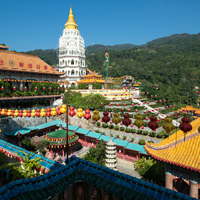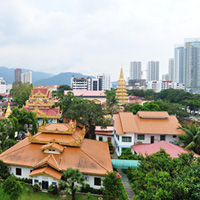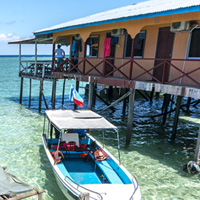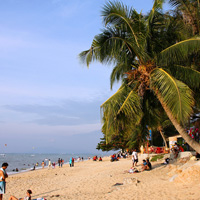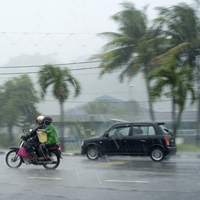Malaysia
Coastal BeachesMalaysia is a Southeast Asian country located partly on a peninsula of the Asian mainland and partly on the northern third of the island of Borneo. It is known for its diverse cultural heritage, which is a blend of Malay, Chinese, Indian, and indigenous cultures and customs. The country's landscape is equally diverse, ranging from expansive, lush rainforests and mountain ranges to beautiful beaches and modern, bustling cities. Kuala Lumpur, the capital, is home to colonial buildings, busy shopping districts such as Bukit Bintang, and skyscrapers such as the iconic, 451m-tall Petronas Twin Towers. Malaysia has a rapidly developing economy that is driven by its industry and tourism sectors. The country is also renowned for its cuisine, which reflects the multi-ethnic makeup of its population, and is characterized by a fusion of flavors and dishes. English is widely spoken, which makes it easier for tourists to navigate the country. Malaysia's climate is equatorial, with high humidity and temperatures staying relatively constant throughout the year. It experiences a monsoon season from November to February on the east coast, which affects the tourism and fishing industries. The country is also known for its wildlife, including endangered species such as orangutans and tigers. Malaysia's commitment to conservation is evident in its numerous national parks and wildlife reserves, which are popular with both researchers and ecotourists. The country's education system is evolving, with a focus on higher education and international partnerships. Malaysia is also a member of various international organizations, including the United Nations, the Asian Development Bank, and the Association of Southeast Asian Nations (ASEAN), playing a significant role in regional diplomacy and trade.
 GeoBlue
GeoBlueGet Quote
GeoBlue is a trusted leader in international health insurance. Wherever your destination, GeoBlue can keep you and your family covered with the right health insurance. Get a GeoBlue Quote Today!
 GeoBlue
GeoBlueGeoBlue is a trusted leader in international health insurance. Wherever your destination, GeoBlue can keep you and your family covered with the right health insurance. Get a GeoBlue Quote Today!
Get Quote
Living in Malaysia
Best Places to Live in Malaysia
Visa & Residency
Obtaining a residency in Malaysia can be a straightforward process, but it requires careful preparation and adherence to the country's policies. The most popular residency visa program for expats is the Malaysia My Second Home (MM2H) program. This program allows foreigners to obtain a long-term visa to live in Malaysia, provided they meet certain financial criteria. The process involves submitting a range of documents, including proof of financial capability, such as bank statements showing liquid assets, a minimum monthly income, and a medical insurance policy. Applicants must also undergo a medical check-up in Malaysia. The MM2H visa is initially valid for a period of ten years and is renewable. It is particularly attractive to retirees and expats looking for a long-term stay in Malaysia. The application can be submitted directly or through an authorized agent, which can simplify the process. However, the Malaysian government occasionally revises the MM2H requirements, so it is essential to check the latest regulations. For those not eligible for the MM2H program or seeking alternative options, there are employment passes for professionals who have a job offer in Malaysia. These require sponsorship from a Malaysian company and are typically valid for 1-2 years, renewable as long as the employment continues. While Malaysia does not have a specific visa for digital nomads, many opt to use the tourist visa, which allows them to stay for up to 90 days. This visa does not permit employment in Malaysia, so digital nomads must ensure their income is sourced from outside the country. Overall, the process of obtaining a residency visa in Malaysia is considered average in terms of difficulty. It is essential to comply with all requirements and stay updated on any changes to immigration policies. Expats are advised to plan their visa application well in advance and seek professional advice if necessary.
Healthcare in Malaysia
Malaysia offers a comprehensive healthcare system that includes both public and private healthcare services. The public healthcare system is heavily subsidized by the government, making it highly affordable for citizens. It is funded by taxes and provides a wide range of services from general treatment to complex surgeries. However, due to high demand, public facilities may experience long wait times and limited availability of certain treatments. Private healthcare in Malaysia is known for its high quality and efficiency, with shorter wait times and more comfortable amenities. It is more expensive than public healthcare but still reasonably priced compared to Western standards. Expatriates and digital nomads can access public healthcare by paying out-of-pocket at a higher rate than citizens or they can opt for private healthcare, which many choose due to its higher quality and immediate access. Some expats may be covered by their employment benefits or choose to purchase private health insurance.
Cost of Living
The cost of living in Malaysia is considered moderate when compared to Western countries, with affordable housing, food, and transportation costs.
Weather
Malaysia has a tropical rainforest climate with high humidity and warm temperatures throughout the year. The country experiences two monsoon seasons, the Southwest Monsoon from May to September and the Northeast Monsoon from November to March. Rainfall is frequent and heavy, especially during the monsoon seasons, but there are also periods of dry weather.
Educational System in Malaysia
The educational system in Malaysia is a reflection of its diverse culture and commitment to academic excellence. Education is overseen by the Ministry of Education and is mandatory for children between the ages of 6 and 15, which covers primary and lower secondary education. The system is divided into pre-school, primary education, secondary education, and post-secondary education. Pre-school, for children aged 4 to 6, is optional. Primary education starts at the age of 7 and lasts for six years, leading to the Ujian Pencapaian Sekolah Rendah (UPSR) examination. Secondary education is divided into lower secondary, which is Form 1 to Form 3, and upper secondary, which is Form 4 and Form 5. At the end of Form 3, students take the PT3 examination, and at the end of Form 5, students sit for the Sijil Pelajaran Malaysia (SPM), which is equivalent to the O-Level examination. Students may then choose to continue to Form 6 (lower and upper), which leads to the Sijil Tinggi Persekolahan Malaysia (STPM), or enter vocational and technical schools. The medium of instruction is Bahasa Malaysia, but English is a compulsory subject in all schools. are available, offering British, American, and other international curricula, and are popular among expatriates. The quality of education is generally high, with a focus on holistic development and ICT literacy.
Universities in Malaysia
The university system in Malaysia is a blend of public and private institutions that offer a wide range of undergraduate and postgraduate programs. Public universities are funded by the government and are highly regarded, with the University of Malaya, Universiti Putra Malaysia, and Universiti Kebangsaan Malaysia being some of the top institutions. Private universities and colleges, including foreign university branch campuses like Monash University Malaysia and the University of Nottingham Malaysia Campus, offer additional options for higher education. Undergraduate degrees typically take three to four years to complete, while a master's degree usually requires one to two years, and a doctoral degree can take three to five years. The academic year is divided into two semesters, with a short break in between and a longer break at the end of the year. Admission to universities is competitive, especially for public institutions, and is based on academic performance and entrance examinations. The cost of tuition varies widely depending on the institution and program of study, with public universities being substantially cheaper than private ones. International students are welcomed and there are services to help them adapt to life in Malaysia. English is the medium of instruction for most programs, especially at the postgraduate level.
Copyright 1997-2025 Burlingame Interactive, Inc.

